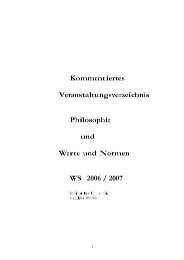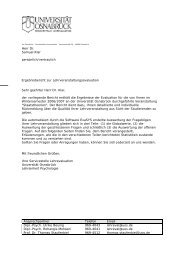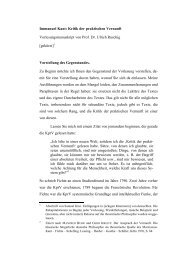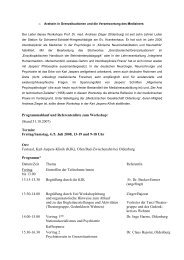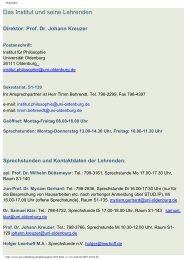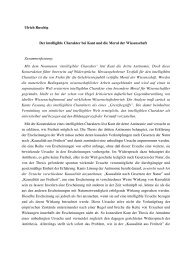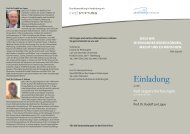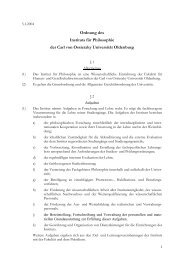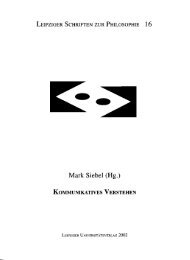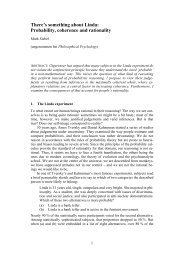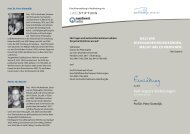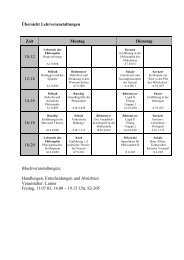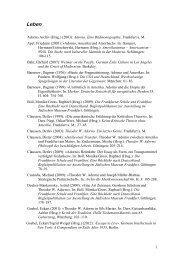udiengan - Institut für Philosophie - Universität Oldenburg
udiengan - Institut für Philosophie - Universität Oldenburg
udiengan - Institut für Philosophie - Universität Oldenburg
Erfolgreiche ePaper selbst erstellen
Machen Sie aus Ihren PDF Publikationen ein blätterbares Flipbook mit unserer einzigartigen Google optimierten e-Paper Software.
Diploma Supplement<br />
8. INFORMATION ON THE GERMAN HIGHER EDUCATION<br />
SYSTEM<br />
8.1 Types of <strong>Institut</strong>ions and <strong>Institut</strong>ional Status<br />
Higher education (HE) studies in Germany are offered at three types of Higher<br />
Education <strong>Institut</strong>ions (HEI). 7<br />
- Universitäten (Universities) including various specialized institutions, offer<br />
the whole range of academic disciplines. In the German tradition, universities<br />
focus in particular on basic research so that advanced stages of study have<br />
mainly theoretical orientation and research-oriented components.<br />
- Fachhochschulen (Universities of Applied Sciences) concentrate their study<br />
programmes in engineering and other technical disciplines, business-related<br />
studies, social work, and design areas. The common mission of applied research<br />
and development implies a distinct application-oriented focus and professional<br />
character of studies, which include integrated and supervised work assignments<br />
in industry, enterprises or other relevant institutions.<br />
- Kunst- und Musikhochschulen (Universities of Art/Music) offer studies for<br />
artistic careers in fine arts, performing arts and music; in such fields as directing,<br />
production, writing in theatre, film, and other media; and in a variety of<br />
design areas, architecture, media and communication.<br />
Higher Education <strong>Institut</strong>ions are either state or state-recognized institutions. In<br />
their operations, including the organization of studies and the designation and<br />
award of degrees, they are both subject to higher education legislation.<br />
8.2 Types of Programmes and Degrees Awarded<br />
Studies in all three types of institutions have traditionally been offered in<br />
integrated "long" (one-tier) programmes leading to Diplom- or Magister Artium<br />
degrees or completed by a Staatsprüfung (State Examination).<br />
Within the framework of the Bologna-Process one-tier study programmes are<br />
successively being replaced by a two-tier study system. Since 1998, a scheme of<br />
first- and second-level degree programmes (Bachelor and Master) was introduced<br />
to be offered parallel to or instead of integrated "long" programmes.<br />
These programmes are designed to provide enlarged variety and flexibility to<br />
students in planning and pursuing educational objectives, they also enhance<br />
international compatibility of studies.<br />
For details cf. Sec. 8.4.1, 8.4.2, and 8.4.3 respectively. Table 1 provides a<br />
synoptic summary.<br />
8.3 Approval/Accreditation of Programmes and Degrees<br />
To ensure quality and comparability of qualifications, the organization of<br />
studies and general degree requirements have to conform to principles and<br />
regulations established by the Standing Conference of the Ministers of Education<br />
and Cultural Affairs of the Länder in the Federal Republic of Germany<br />
(KMK). 8 In 1999, a system of accreditation for programmes of study has<br />
become operational under the control of an Accreditation Council at national<br />
level. All new programmes have to be accredited under this scheme; after a<br />
successful accreditation they receive the quality-label of the Accreditation<br />
Council. 9<br />
7<br />
8 Common structural guidelines of the Länder as set out in Article 9<br />
Clause 2 of the Framework Act for Higher Education (HRG) for the<br />
accreditation of Bachelor’s and Master’s study courses (Resolution of<br />
the Standing Conference of the Ministers of Education and Cultural<br />
Affairs of the Länder in the Federal Republic of Germany of 10.10.<br />
9<br />
2003, as amended on 21.4.2005).<br />
“Law establishing a Foundation ‘Foundation for the Accreditation of<br />
Study Programmes in Germany’”, entered into force as from<br />
26.2.2005, GV. NRW. 2005, nr. 5, p. 45 in connection with the<br />
Declaration of the Länder to the Foundation “Foundation: Foundation<br />
for the Accreditation of Study Programmes in Germany” (Resolution of<br />
the Standing Conference of the Ministers of Education and Cultural<br />
Affairs of the Länder in the Federal Republic of Germany of<br />
16.12.2004.



